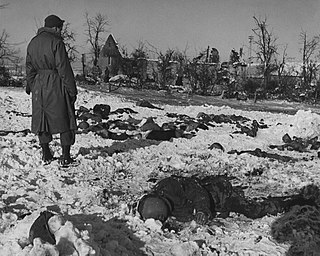Related Research Articles

The Nuremberg trials were held by the Allies against representatives of the defeated Nazi Germany, for plotting and carrying out invasions of other countries, and other crimes, in World War II.
The Nuremberg Code is a set of ethical research principles for human experimentation created by the court in U.S. v Brandt, one of the Subsequent Nuremberg trials that were held after the Second World War.

A war crime is a violation of the laws of war that gives rise to individual criminal responsibility for actions by combatants in action, such as intentionally killing civilians or intentionally killing prisoners of war, torture, taking hostages, unnecessarily destroying civilian property, deception by perfidy, wartime sexual violence, pillaging, and for any individual that is part of the command structure who orders any attempt to committing mass killings including genocide or ethnic cleansing, the granting of no quarter despite surrender, the conscription of children in the military and flouting the legal distinctions of proportionality and military necessity.
Universal jurisdiction is a legal principle that allows states or international organizations to claim criminal jurisdiction over an accused person regardless of where the alleged crime was committed, and regardless of the accused's nationality, country of residence, or any other relation to the prosecuting entity. Crimes prosecuted under universal jurisdiction are considered crimes against all, too serious to tolerate jurisdictional arbitrage.

Crimes against humanity are widespread or systemic criminal acts which are committed by or on behalf of a de facto authority, usually by or on behalf of a state, that grossly violate human rights. Unlike war crimes, crimes against humanity do not have to take place within the context of wars, and they apply to widespread practices rather than acts which are committed by individuals. Although crimes against humanity apply to acts which are committed by or on behalf of authorities, they do not need to be part of an official policy, and they only need to be tolerated by authorities. The first prosecution for crimes against humanity took place during the Nuremberg trials. Initially considered for legal use, widely in international law, following the Holocaust, a global standard of human rights was articulated in the Universal Declaration of Human Rights (1948). Political groups or states that violate or incite violations of human rights norms, as they are listed in the Declaration, are expressions of the political pathologies which are associated with crimes against humanity.

The International Criminal Tribunal for Rwanda was an international court established in November 1994 by the United Nations Security Council in Resolution 955 in order to judge people responsible for the Rwandan genocide and other serious violations of international law in Rwanda, or by Rwandan citizens in nearby states, between 1 January and 31 December 1994. The court eventually convicted 61 individuals at a cost of $1.3 billion.

Judgment at Nuremberg is a 1961 American epic courtroom drama film directed and produced by Stanley Kramer, written by Abby Mann and starring Spencer Tracy, Burt Lancaster, Richard Widmark, Maximilian Schell, Werner Klemperer, Marlene Dietrich, Judy Garland, William Shatner, and Montgomery Clift. Set in Nuremberg, Germany, in 1948, the film depicts a fictionalized version of the Judges' Trial of 1947, one of the 12 U.S. Nuremberg Military Tribunals conducted before the U.S. military.

Robert Houghwout Jackson was an American lawyer, jurist, and politician who served as an associate justice of the U.S. Supreme Court from 1941 until his death in 1954. He had previously served as United States Solicitor General and United States Attorney General, and is the only person to have held all three of those offices. Jackson was also notable for his work as Chief United States Prosecutor at the Nuremberg trials of Nazi war criminals following World War II.
The Nuremberg principles are a set of guidelines for determining what constitutes a war crime. The document was created by the International Law Commission of the United Nations to codify the legal principles underlying the Nuremberg Trials of Nazi party members following World War II.
A war of aggression, sometimes also war of conquest, is a military conflict waged without the justification of self-defense, usually for territorial gain and subjugation.

The Guantanamo military commissions were established by President George W. Bush – through a military order – on November 13, 2001, to try certain non-citizen terrorism suspects at the Guantanamo Bay prison. To date, there have been a total of eight convictions in the military commissions, six through plea agreements with the defendants. Several of the eight convictions have been overturned in whole or in part on appeal, mostly by U.S. federal courts.

Thomas Joseph Dodd was an American attorney and diplomat who served as a United States Senator and Representative from Connecticut. He is the father of former U.S. Senator Christopher Dodd and Thomas J. Dodd Jr., who served as the United States Ambassador to Uruguay from 1993 to 1997 and to Costa Rica from 1997 to 2001.

International criminal law (ICL) is a body of public international law designed to prohibit certain categories of conduct commonly viewed as serious atrocities and to make perpetrators of such conduct criminally accountable for their perpetration. The core crimes under international law are genocide, war crimes, crimes against humanity, and the crime of aggression.

Benjamin Berell Ferencz is an American lawyer. He was an investigator of Nazi war crimes after World War II and the chief prosecutor for the United States Army at the Einsatzgruppen Trial, one of the 12 Subsequent Nuremberg Trials held by the U.S. authorities at Nuremberg, Germany. Later, he became an advocate of international rule of law and for the establishment of an International Criminal Court. From 1985 to 1996, he was adjunct professor of international law at Pace University.
Benjamin Kaplan was an American copyright and procedure scholar and jurist. He was also notable as "one of the principal architects" of the Nuremberg trials. And as Reporter to the U.S. Judicial Conference Advisory Committee on Civil Rules, he played a pivotal role in the 1966 revisions to Federal Rule of Civil Procedure 23, which transformed class action practice in the U.S.

Court TV is an American digital broadcast network and former cable television channel. It was originally launched in 1991 with a focus on crime-themed programs such as the true crime documentary series, legal analysis talk shows, and live news coverage of prominent criminal cases. In 2008, the original cable channel became TruTV. The channel relaunched on May 8, 2019 as a digital broadcast television network owned by Katz Broadcasting, a subsidiary of the E. W. Scripps Company. Court TV is also available via streaming services such as YouTube TV and Pluto TV, and its audio feed is available on Sirius XM channel 793.

Superior orders, also known as the Nuremberg defense or just following orders, is a plea in a court of law that a person, whether a member of the military, law enforcement, a firefighting force, or the civilian population, should not be considered guilty of committing actions that were ordered by a superior officer or official.

The following is a bibliography of works devoted to the Nuremberg Trials.
The Court of Appeal of Alberta is a Canadian appellate court.

"Judgment at Nuremberg" is an American television play broadcast live on April 16, 1959, as part of the CBS television series, Playhouse 90. It was a courtroom drama written by Abby Mann and directed by George Roy Hill that depicts the trial of four German judicial officials as part of the Nuremberg trials. Claude Rains starred as the presiding judge with Maximilian Schell as the defense attorney, Melvyn Douglas as the prosecutor, and Paul Lukas as the former German Minister of Justice.
References
- ↑ Corcelli, John (May 2005). "International Law". Canadian Communications Foundation. Retrieved 7 May 2010.